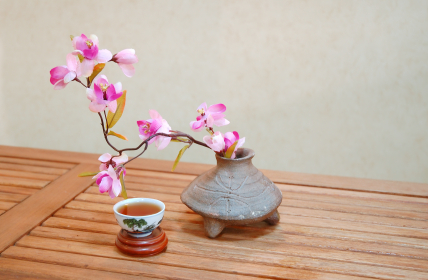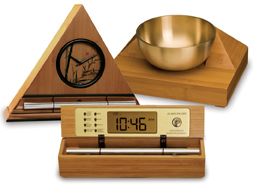
Meeting Challenges with An Open Heart
Reach deep, and find your own inner balance in the midst of crisis
Most of us understand about life being tough, and what it means to be, at least occasionally, on the losing side of things. The end of a relationship, standing helpless as loved ones suffer health problems, experiencing personal financial devastation, or even the grief of losing a job can be debilitating in their intensity, and staggering in their scope. Just switching on the news reveals that if we share nothing else as a world community, we share this one thing: No life is without its own, unique set of tests and troubles. Keeping an open heart in the midst of life’s challenges might be difficult, but it can also be a powerful tool for coping.
Success is not final, failure is not fatal: it is the courage to continue that counts. —Winston Churchill
Courage is easy to talk about, but where does it come from, and where do we find the ability to climb out of bed in the morning when the only thing that’s recognizable is the feeling of despair? Popular wisdom tells us that it’s not what life presents us that’s important, but the way in which we choose to respond. That may be perfectly true, but it doesn’t make it easy. Mariana Caplan, Ph.D., is a counselor, professor of yogic and transpersonal psychologies, and the author of seven books in the fields of psychology and spirituality, including Halfway Up the Mountain and To Touch is to Live (Hohm, 2002), and Eyes Wide Open: Cultivating Discernment on the Spiritual Path (Sounds True, 2009). Caplan, who has lived in villages in India, Central and South America, and Europe, holds degrees in cultural anthropology, counseling psychology, and contemporary spirituality, and has spent years researching and practicing the world’s great mystical traditions. She currently resides in the San Francisco Bay area and teaches at the California Institute of Integral Studies.
“There are many things we cannot control,” acknowledges Caplan, “but one thing we can control, or at least cultivate, is our attitude towards ourselves, our lives, and the situations that life presents. It is through the cultivation of discernment that we are able to have more choice not in terms of what life gives us, but whether we experience these things with gratitude and openness, or whether we fall into defeat.”
Not that this means that it’s an easy task, or that all hardships offer the same challenges. Losing a child, losing a job, and losing a home through foreclosure produce understandably different responses. The sudden illness of a family member or friend, or the diagnosis of a serious health condition of our own likewise elicits a whole host of reactions, and requires any number of considerations.
Respected retreat leader James Finley, Ph.D., and author, along with Carolyn Myss, of the learning course Transforming Trauma (Sounds True, 2009), suggests that in times of extreme difficulty, it’s essential to consider the details of what, exactly, is happening to us, and to accept that we’re very likely doing our best to understand and work through the situation. This, he explains, is the reality of crisis management—what are reality-based ways of understanding the moment, what are the options, and what can be done to provide the best possible outcome?
“We have to consider the impact of the event on our sense of security and identity,” says Finley. “The crisis or trauma has accessed us, and has threatened our sense of who we are. This is the interior dimension of the crisis. This has to do with understanding what trauma is—it’s the experience of being powerless. It’s important to establish a boundary between us, and what is being inflicted or is about to inflect harm. That applies to whatever the crisis is: a medical diagnosis, a relationship falling apart, or a natural disaster.”
The world is full of suffering, it is also full of overcoming it. —Helen Keller
Successfully transcending suffering, says Finley, requires moving toward our centers, and grounding ourselves in this space. This, he says, is where spirituality comes in. “Spirituality is a resource in healing,” he continues. “It helps us to stay grounded in the midst of the circumstances of life, and until you are grounded, you can’t effectively deal with the event. We may have to ride the waves of the storm, but it keeps our boat from tipping over. We might not be able to stop the storm, but maybe we can do something to stabilize ourselves, and ride it though.”

. Once you experience the Zen Timepiece's progressive tones, you'll never want to meditate any other way. It serves as the perfect meditation timer.
First, says Finley, find what it is in your life that serves as your point of contact with the spiritual depth that transcends whatever is happening; the realization that inner peace is not dependent on external conditions. This is personal for each of us. For some, it might be religious faith. For others, it’s a guided program, a loved one, or nature.
“When we get afraid,” says Finley, “our hearts contract, our souls contract. Don’t panic. Pause. Reground yourself. Go to your point of contact to get your bearings. By practicing emotional sobriety, you don’t contribute to the situation in a negative way. Remember to tell yourself this: I’m nothing but the Self this is happening to. But I’m not JUST the Self that this is happening to.”
The second step is to have a spiritual practice. Finley defines this as any act habitually entered into with our whole hearts that serves as a way to keep ourselves grounded, and a way to transcend whatever is happening. If our point of contact is a loving relationship with another person, then our practice is to keep in touch with them. That doesn’t mean endless phone calls or visits. Carrying a photo of that person in our wallet, or keeping one on our desk, will suffice. It’s about keeping them firmly in our minds eye, and sustaining our consciousness of this person.
“If your pint of contact is nature, then your spiritual practice is to go out into the garden, or to keep plants in the house that you can nurture, or even to stop on the way home from work to walk in a park or another place where you can be surrounded by nature,” continues Finley. “If your point of contact is a spiritual teacher, then your practice might be to carry around a few words by them. All of these are points of meditation, and serve as ballast. We learn to ground ourselves this way, by taking part in a physical act. It takes fidelity to do this. Crisis is intense, but if we are sincere, we can slowly stabilize.” Third, we must accept that this groundedness in meditation in of itself does not solve the crisis. If a relationship is falling apart, a tornado has struck, or we’ve learned a loved one has a terminal disease, we are still left to face that reality. We ground ourselves as a resource from which to draw the courage to face whatever the catastrophe is. Crisis intervention includes acknowledging and validating the experience, not denying it or diminishing it.
“So, we ground ourselves at the level of the intensity of the pain,” Finley says. “Once we’re there, then we can move forward from that place. Too often, we get stuck in not just what happened to us, but what the thing that happened did to us.”
Pain is inevitable. Suffering is optional. —Anonymous
“Everybody experiences personal challenges in their lives,” agrees Caplan. “If not at the present moment, then in the future or in the past. I think we need to learn to constantly open to what we are given, to feel the feelings of it, to live it fully. We cultivate a trust in life, even when we don’t feel it, and we keep putting one foot in front of the other. Eventually, everything will change—it is just how things are.”

Meditation
It’s always easier, of course, to consider such things when our lives are humming along in relative harmony, our families are healthy, and our finances are secure. But challenges will come. Hopefully, we’ll discover when we come out on the other side of our experience, however difficult it was, that it wasn’t just painful, but that we have somehow been transformed by it. We may have learned to be more at peace, become more humble, or found a previously untapped inner wisdom. Maybe, by deepening our spiritual practices now, we’ll be that much more prepared should we suddenly be presented with a less happy state of affairs. Just as our bodies benefit from regular physical exercise, perhaps it’s also possible to strengthen and fortify our souls. It seems, at the very least, worth a try.
Use our unique “Zen Clock” which functions as a Yoga & Meditation Timer. It features a long-resonating acoustic chime that brings your meditation or yoga session to a gradual close, preserving the environment of stillness while also acting as an effective time signal. Our Yoga Timer & Clock can be programmed to chime at the end of the meditation or yoga session or periodically throughout the session as a kind of sonic yantra. The beauty and functionality of the Zen Clock/Timer makes it a meditation tool that can actually help you “make time” for meditation in your life. Bring yourself back to balance.
adapted from healinglifestyles.com By Debra Bokur

It's exquisite sounds summon your consciousness out of your meditative state with a series of subtle gongs.
Now & Zen – The Meditation Timer Shop
1638 Pearl Street
Boulder, CO 80302
(800) 779-6383
Posted in Meditation Timers, Meditation Tools